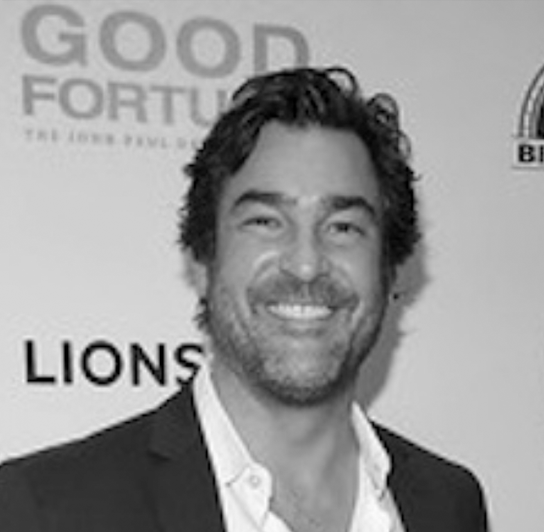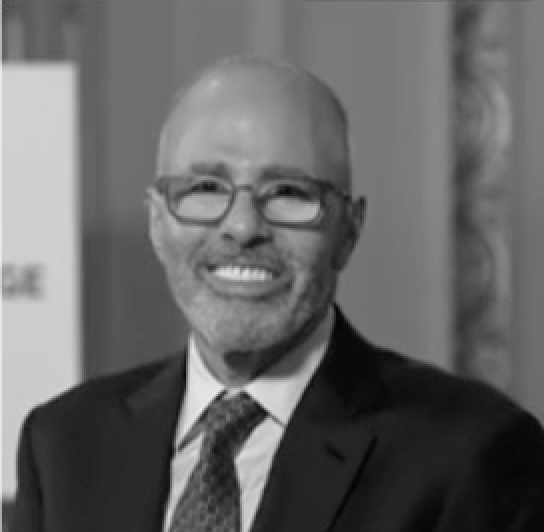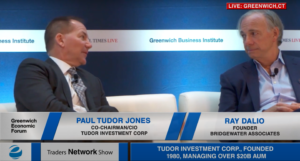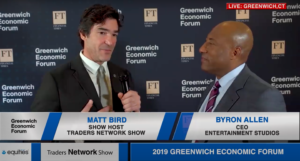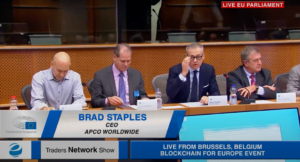Ray Dalio and Paul Tudor Jones Deliver Fireside Chat at Greenwich Economic Forum | Traders Network Show – Greenwich, CT
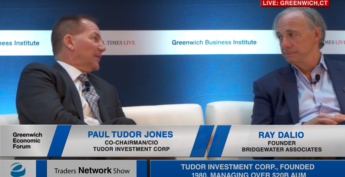
Contributed by: Show Editorial Team
Paul Tudor Jones, Co-Chairman/CIO of Tudor Investment Corp., interviews Ray Dalio, Founder of Bridgewater Associates at Greenwich Economic Forum (Greenwich, CT)
HIGHLIGHTS
- Tudor Investment Corp. founded in 1980, managing over $20 billion in AUM
- Dalio published book called The World has Gone Mad and the System is Broken
- Bridgewater is the largest hedge fund in the world with over $160 billion in AUM
FULL COVERAGE
INTERVIEW TRANSCRIPTS: Ray Dalio, Founder of Bridgewater Associates and Paul Tudor Jones, CIO/Co-Chairman of Tudor Investment Corp.
Julia La Roche – Correspondent, Yahoo Finance: 00:02
Thank you Governor Lamont and First Selectman Peter Tesei. It’s an honor to serve as your master of ceremonies today for the second Greenwich Economic Forum. So thank you Bruce and Jim for inviting me to represent Yahoo Finance here. Now, our first panel of the day is a real treat. We have two returning keynote speakers joining one another for a fireside chat. They need no introduction. It is Ray Dalio, the Co-CIO of Bridgewater Associates and Paul Tudor Jones, the CIO of Tudor Investment Corporation. Two legends in the industry in conversation.
Paul Tudor Jones – Co-Chairman/CIO, Tudor Investment Corp.: 00:51
Hey I’ve got to just say one thing. As you know, my third daughter Dottie, is graduating from getting a master’s in data science in December. And so the question is what is she going to do? Is she going to go, she’s probably going to come into our business the hedge fund world. And so I’m trying to figure out, she’s trying to figure out, do I try and teach her myself, my craft, which may be outdated cause the future might be, some would say, might be machines and models or does she go the quant route as opposed to the macro discretionary route? Either way, she’s probably going to be involved in macro. What I’ve told her, I said, listen, because she had a undergraduate degree in psychology, she got a master’s in psychology, so she doesn’t have the economics training. I was an economics major. And I said, here’s what’s going to happen.
Paul Tudor Jones – Co-Chairman/CIO, Tudor Investment Corp.: 01:58
No matter what you do when you graduate, you’re going to go to the Bridgewater website and you’re going to get on economicprinciples.com where there are over 2000 pages. And I said, you’re going to read every single page because if you want to truly understand macroeconomics, there literally is no better education than what’s available publicly on that website. And just as someone who consumes virtually everything that’s written on modern economic theory, macro, etc. I would kind of like and Bridgewater to the charter school movement in education where you had traditional public education and then 30 years ago, practitioners by doing, created a new way of teaching in classrooms that has been extraordinarily successful. And you can see the side-by-side metrics and there’s not even a comparison. So I would say that I’m so thankful to be having this conversation with what I think is certainly one of the greatest economists living today who’s made economics understandable and comprehensible and relevant. And it’s because you are a practitioner as opposed to a theorist living in academia. And all I’ve got to say is that you’re really good now, but I actually think that when you die, you’re going to be really famous.
Ray Dalio – Founder, Bridgewater Associates: 03:48
Oh, I could look forward to that. Paul and I have known each other for about 30 years. You were clerking on the cotton exchange. And so it was about there. And so anyway, you can tell we fall in love with each other. Says so. And you know, well, I won’t take the time to give you to give the back at you because we got to live with it at the time. And we talk about that. I just wrote a piece I’m now at a stage in my life, which I’m cheering some thoughts. And so yeah, I put those things on a website and I also do LinkedIn. And so I just wrote a piece for Bridgewater and also a piece for a LinkedIn that’ll come out today, which is titled The World Has Gone Mad and the System is Broken. And so Paul and I talked about that.
Paul Tudor Jones – Co-Chairman/CIO, Tudor Investment Corp.: 04:44
Can I just say one thing? It was so funny because over the last couple of days, ever since we decided to do this, I kept thinking, okay, you’ve got to control yourself because I know this is going to be on a Yahoo Finance. You’ve got to be careful what you say because you don’t want to have it come back and be a problem for you down the road. Because when you look at, I can’t wait to read your newsletter to see just how actually honest you were. Cause when you look at it you’re going, Oh my Lord, this is not even real.
Ray Dalio – Founder, Bridgewater Associates: 05:22
Right. So, I think we should talk about why it’s not even real. So how about you? You would give it the first go.
Paul Tudor Jones – Co-Chairman/CIO, Tudor Investment Corp.: 05:36
I’m going to just start with saying Donald Trump is the greatest salesman in the history of this country. He has somehow been able to move the Republican party into believing that a 5% budget deficit adjusted for the economic strength that we have right now is a reasonable proposition and one that is a good government policy. And then similarly he has through, and I’m being charitable here, great moral suasion convinced the federal reserve board that running negative real rates with a 50 year low in unemployment is also reasonable monetary policy with no consequences without what I really loved in chairman Pal’s last fed meeting when they ask him, are there any excesses, are there any bubbles? He goes, no I really can’t see any I think that, you know, we don’t have the problems that we had in 2008 etc. And it’s like asking somebody why they’re driving funny and not mentioning the fact they had 10 shots of vodka beforehand.
Paul Tudor Jones – Co-Chairman/CIO, Tudor Investment Corp.: 07:07
Because clearly the low interest rate policy that we’re pursuing is creating an excess and the assets and in our public deficits, which, you know, at the current pace, in less than 10 years, we will have exceeded that threshold where Greece had its issue. So I looked, I just look at the fiscal monetary mix. It’s the most emulative that I think I’ve ever seen. Again, economically adjusted and it is no one or the stock markets at new highs. It’s literally, I think the most conducive environment, certainly in the short run for economic growth and strength that I’ve ever seen. And you add on top of that a consolidated 11% budget deficit and China, the second biggest economy, 3% in Japan. Wow. It’s a heady brew. It’s a heady economic brew that we’re all consuming.
Ray Dalio – Founder, Bridgewater Associates: 08:07
Thanks Paul. I’ll give you my thoughts. There I have a template which is that there’s productivity over a period of time, raises our living standards and so how you invent and change and improved as one as one of the things over a long period of time. And then there’s a short term debt cycle which we call a business cycle which we’re now 10 years into and it’s long. And then most importantly, there’s a long-term debt cycle. And the long-term debt cycle means that you can always hit the economy with stimulation. You can always give it a jolt. And so the way that we used to do that was with interest rate cuts, but when you hit zero like in 2008 and 2009, we hit zero.
Ray Dalio – Founder, Bridgewater Associates: 09:09
Just like in 1929 and 32, we hit zero. The same thing happens in terms of the need to print money and buy financial assets. And that printing of money and buying financial assets, about $15 trillion has created the mechanics of it is you could not print the money, but the mechanics of it is that there is the purchases of those financial assets by the central bank who gives money to the central bank, to investors who sell their bonds. And now they have $15 trillion more money. And so we now have, that’s created the paradigm that we have. And so anybody who’s in the investment business right now or an investor knows that the world is awash with money. And the reason that is because investors take that money and they buy other investments. And so there’s an abundance of money for those who have credit worthiness, they can borrow that produced and mechanical reaction in which the interest rates were low in relationship to the return on equity for companies.
Ray Dalio – Founder, Bridgewater Associates: 10:21
So they would buy their equity back, they would merge and there would be acquisitions and it pushed the interest rates so low that we have such low interest rates and negative interest rates in some countries and near negative interest rates here. And so the world is looking for a yield and because the world is looking for a yield for something companies also can sell dreams rather than earnings. So we’re living in a world now where you no longer really as much need earning. So the number of companies that produce earnings is the lowest since the .com bubble in terms of their need because you can sell the dream. And so there’s a reaching for the yield and we have a negative and this as a result of the accumulation of the money at the top and technology we have a situation in which naturally those who have money have a lot of money in credit and those, it doesn’t trickle down.
Ray Dalio – Founder, Bridgewater Associates: 11:29
It’s not going to trickle down because we also have a system where at the, at the lower ends, the balance sheets, the income statement, the nature of lending is not the same. And so it doesn’t trickle down. And as a result, we have a large wealth gap. And so we have a situation with a large wealth gap. So there are three things that exist today that haven’t existed at any time since the 1930s. You know, one of the main things in my life that I’ve learned is that whenever I’ve been surprised, it’s because of things that haven’t happened to me before. And mostly in haven’t happened in my lifetime so that I’ve had to study history and because if it’s happened before and those three things that are happening today our last happened in the 1935 to 40 period. And the, and what I mean is first – there is a large wealth gap.
Ray Dalio – Founder, Bridgewater Associates: 12:26
It’s a big thing. It’ll change, it’ll affect markets, it’ll affect our society in a very important way. So as that wealth gap produces populism of the left and populism of the right and there is a war that is going on and that war has a big effect on markets and it has a big effect on economies, has a big effect on markets. So if we were to say what would be the impact, let’s say of a democratic election and how taxes will change as a result of that tech, corporate taxes and so on, there’ll be unwind. And so that will be an issue in pricing of markets and so on. But there’s a large wealth gap that’s not being dealt with. So there’s a large wealth gap at the time that there’s not effective monetary policy. So number one, large wealth gap and political gap and polarity that we are already each other’s throats and it is not functional.
Ray Dalio – Founder, Bridgewater Associates: 13:24
The combination of how the media and the political system works or doesn’t work together is a major problem. Number two, very much like the 30s. Number two is the absence of the effectiveness of monetary policy because you can’t make it go further. Europe is dead in the water. Japan is dead in the water. And so you can’t just print more money and put it in the hands of investors and that system just is not going to work. So now you have to deal with the mechanics of, do you have political coordination? I don’t think so. Do you have political coordination with monetary coordination? Politicians can be coordinated with each other and they can’t be coordinated with a monetary policy. So you don’t have the stimulus. Now let’s imagine you have a downturn and you don’t have a good stimulate, very similar to 1930s.
Ray Dalio – Founder, Bridgewater Associates: 14:19
It’s not a pretty picture. If we have a wealth gap that we’re at each other’s throats and this is when times are good, when the stock market’s at by and the unemployment is rates low, imagine what it’s going to be like when we get a downturn and the downturn woke up. When we get a downturn, we don’t have effective monetary policy. And number three in that time is the important thing is the change in the world war. Meaning what we have now is not a unit polar world war. We don’t have history has shown that periods of peace follow periods of war because there becomes a dominant world power and you create a world of water and no one wants to fight the dominant world power. And that’s been the nature of what we’ve had since essentially World War II.
Ray Dalio – Founder, Bridgewater Associates: 15:16
And then when there’s a rise of a power to challenge an existing power, then there is conflict. There’s going to be conflict, there’s going to be certainly lots of things that disagree with. And so when we deal with the, let’s say, the rise of China or other countries or perhaps the decline of the United States in some ways we have things to argue about. So there’s different kinds of Wars. We call them Wars, but there’s a trade war, there’s a technology war, there’s a geopolitical war and there could be a capital war. The capacity of that war is a material thing. So when we look at that analogous position, I would say you’re at the end of the cycle, meaning the force that drove most from 2008 and 09, the bottom in 2008, nine to where we are today, which was quantitative easing and the lowering of interest rates and corporate tax cuts did not push us farther, we can’t go farther.
Ray Dalio – Founder, Bridgewater Associates: 16:22
And from there we have those elements of risk. So when I look at it is, yes, it’s crazy. It’s crazy that we have negative a bond yields were, in my opinion, we’re near the end and late stages of a reserve currency system, we have a Fiat monetary system. So when you talk about, let’s say that we’re not only we have negative rates, but yes, we’re going to have much larger deficits. We need pap, because how do you get the money spent? So there’s going to be much bigger deficits. Well, we’re going to have bigger deficits if we didn’t have a downturn. Right? Cause we have record deficits. And then when you put them down, turn on it and you take it cyclical. And that’s not half the story.
Ray Dalio – Founder, Bridgewater Associates: 17:14
Because the larger story are the unfunded liabilities. They’re those unfunded liabilities or pension liabilities and their health care liabilities. Those are promises to deliver. So we’re living here in the state and we understand that. And so you have, you could call it debt or you can call it pension liabilities, but we have pension liabilities. We have a lot IOUs that are either going to be funded by tax increases or they’ll have to be spending cuts. And we in the state of Connecticut know it’s not humane to cut any expenditures anymore. And you can’t raise taxes anymore either. And so then you’re dealing with, that’s a country problem. And then you’re going to need to, how you’re going to deal with that. You’re going to print money because what you’re going to do is you’re run a deficit. You’re going to have to spend it. That’s the difference between what you face governor and what the federal government is. They can print money so they can run deficits and they can then print the money to do it. And that’s what classically happens and that’s your modern monetary theory. That is what we call what is called recently. It’s been called monetary money. There’s nothing modern about it.
Ray Dalio – Founder, Bridgewater Associates: 18:38
So if what I’m saying is if you look at history, nothing is new in history. You go back in history and what we used to call it is pushing on a straight. And so when you have pushing on a string, in other words, you can’t no longer can you print money. No longer can you lower interest rates. You go to what I call monetary policy. Three monetary policy one is you lower interest rates and that stimulates ma. When that runs out, you go to the second type of monetary policy, which is you buy financial assets with printed money. When that runs out, which is out. Then you go to monetary policy three, it has every forms and that form has to do with governments running deficits or they can also call it helicopter money in various ways, running deficits that the central bank monetizes.
Ray Dalio – Founder, Bridgewater Associates: 19:35
And it could take all different forms, but that’s what you get. And that is a classic, you know, reserve currency question in a Fiat monetary system. And so isn’t it mad that when the next downturn we’re going to have lower interest rates, we’re going to print the money and that you’re holding that the negative interest rates. And then the system doesn’t work, it’s gone mad. And then at the reason the system is broken is because there is not, it’s not an equal opportunity system. There’s justifiable complaints about the failure of that system to produce education to do those things. These people are justifiably saying this is broken because the system is broken. It needs to be reformed in a way that works better. In other words, let’s increase the size of the pie. If it’s done smart, you can increase productivity with the increasing the size of the buy at the same time as you could divide it better anyway, I’m going on too long.
Paul Tudor Jones – Co-Chairman/CIO, Tudor Investment Corp.: 20:49
I’m going to let you breathe a second. Modern monetary theory. I love it because when I hear people talk about it and attach some formality to it, I can’t help but think about the evolution of it’s acceptance is kind of the same way that if you think about marijuana, it’s acceptance has changed over time because 50 years ago it was illegal and reprehensible. So modern monetary theory. Can you imagine Paul Bowker even considering modern monetary theory? Then about 30 years ago, we just said no. Same thing with marijuana. Then 20 years ago, all of a sudden, we medicinalized it and Japan actually began to implement the equivalent of modern monetary policy when they began to buy their own government debt. And then about 15 years ago because it was medicinal we then had to decriminalize it. And then 10 years ago it got widespread adoption because the United States did, Europe did a variety, countries did.
Paul Tudor Jones – Co-Chairman/CIO, Tudor Investment Corp.: 21:56
And now we’re at a point where it’s so widely accepted that we sugarcoat it, put it in gummy bear form. And it’s just a, this wildly accepted next day age when there’s a problem cause the next deficit, the typical recession means that the budget devotees is going to increase somewhere between 10 and 30%. Can you imagine adding, can you imagine a 10 or 15% budget deficit and United States in the next downturn? So it’s, it’s incredible to me cause again, I’ll, I’ll, I look at where we are. I mean if you just think about the divisiveness that we have in this country, now think about we have a 5% budget deficit. so say we normalize it, we just went back and normalize it too. So you take off 3% $600 billion. If we subtracted that from where we are economically today, that works out to about 10% of an average family’s income. So imagine if we didn’t have that 3% that we’re borrowing from our children that were fast forwarding on consumption, we’re not going to pay it back.
Paul Tudor Jones – Co-Chairman/CIO, Tudor Investment Corp.: 23:09
I’m just saying and I hear you. And that’s why I look at, I look at the world right now and I look at the asset pricing and the whole thing’s just it’s so incredible to me. If I think about just this next election and the difference between Donald Trump and Elizabeth Warren, we did this poll internally about where the S and P would trade if Elizabeth Warren became president. And then we took the bed and then Biden and Buttigieg etc. And then we took the election probabilities. And so our poll said the, if Elizabeth Warren was elected, the S and P would trade around 20 to 50. I think it’s a 30 50 now. But I’m just saying her policies probably would, assuming that they were implemented probably would give you something like that.
Paul Tudor Jones – Co-Chairman/CIO, Tudor Investment Corp.: 24:14
And then if you just take the election probabilities that would imply and apply what would, if you anchor that, I think Buttigieg, Biden were like 2,700, cause again, they’re going to come in raise taxes. That’s going to cause probably some economic contraction. So that would imply that Donald Trump, if he gets reelected, the S and P is worth 3,600. So as an investor you have to have a view on the election because the outcomes are so extreme. I’ve never seen this kind of polarity in the elections as we have now. And they always say, Oh well did that make any difference who president is, you know, the markets rallied 53% of the time on the Democrats and 52% of the time it does make a difference. Ronald Reagan, when he became president, was a huge difference to the stock market. And I would say who the next president is also going to have a huge impact on the economy, the stock market, particularly asset pricing.
Paul Tudor Jones – Co-Chairman/CIO, Tudor Investment Corp.: 25:21
Because clearly asset prices today, whether it’s us stocks, whether it’s interest rates, whether it’s the dollar, it’s all priced off of, in my opinion, a 5% budget deficit with this incredibly overly stimulated fiscal policy combined with this overly stimulated monetary policy is creating this U S exceptionalism that one day. Like if we normalize our deficit to where Europe is right now, would have a completely different valuations for the stock market valuations for the dollar. The dollar would be substantially lower, I believe. So this next presidential election and what policies they pursue adverts, I think this one is going to be more meaningful than anyone certainly in my lifetime. So it’s going to be really –
Ray Dalio – Founder, Bridgewater Associates: 26:13
I agree with you. So I’m mechanistic, I’m not ideological and just mechanistic. So I do go through the calculations and if you take the way corporate taxes would change the undoing of that that’s worth 7% or 8%. If you take the changes in gap accounting that, so changes in the taxes for corporations, that’s worth about 15% of earnings and a will therefore would drop it on the basis of that alone. If you take then the wealth tax is $2.8 trillion over 10 years. And so that’ll have an effect. So it is, and then that doesn’t have to do with regulation and the changes in regulation. I think we are dealing with the question again like the 30s. Is it populism of the left or is it populism of the right and how’s that going to work? And that’s not just an American issue.
Ray Dalio – Founder, Bridgewater Associates: 27:20
It’s a UK issue in Jeremy Corbyn. It’s a UK, so the, so we have an issue in terms of that politics will certainly matter to asset prices, but at the same time I’m saying we have not made capitalism work for the average person. You and I spend a lot of time talking about philanthropy and Paul really has taught me a lot and he’s been a role model for me through the Robin Hood Foundation of being able to do all sorts of things and then we have just give and other things that he’s done. So he and I know and really deeply believe in the fact that the system is unfair and his own many cases uneconomical because what, what is the economics how is it economically sensible to not have to spend the money to get kids through high school, those disadvantaged and disengaged kids?
Ray Dalio – Founder, Bridgewater Associates: 28:22
Just to put that there were it’s such a pleasure to do with the governor and the state of Connecticut to be able to cost effectively get kids through high school because it’s relatively cheap to do that. And yet the cost of incarceration state, I think you’re the number is $600 million a year spends on incarceration. The probability of what that changes in their life. In terms of what their lives are like, what their impact in terms of crime. We talk about crime in Hartford, Connecticut and those things and the cost on the society, the cost on the environment makes that up. Peanuts type of expenditure and the government doesn’t do those things. So when we look at the wellbeing of the country and you’ll look at what are the things that determine a country that goes bad, well, you have to have something that, that is a fair system that strikes for something like equal opportunity.
Ray Dalio – Founder, Bridgewater Associates: 29:26
And you have to have something that invests in education and infrastructure and those kinds of things in order to make a healthier society. So we have both of those that things are existing that think key question is whether we’re going to be able to come together not a demonize each side. You know, in other words there’s a demonization and there’s a split that’s going on and there’s not a thoughtfulness in terms of how to engineer it. Cause we could make the pie increase, you know, in terms of your programs and I’m looking at my programs that the economic return on investment of finding those things that could be done, that educate people and so on. The all in return on those investments are excellent, but you have a, when you have a state that doesn’t have a, can’t have a budget, they can’t invest in education. So we need to reengineer that. But the, “we” is the key question, will we do it together or will we do it like we’re going to kill each other and that’ll have capital flow implications cause we’re going to run large budget deficits. Capital stays where they like capitalism and capitalism needs to be fixed and if you don’t fix it, you’re going to have a revolution. And then you’re going to almost chase the capitalists away.
Paul Tudor Jones – Co-Chairman/CIO, Tudor Investment Corp.: 31:02
Yup. So just so we’re clear to me that fixing capitalism is so easy. You love measurement metrics. 50 years ago, 6.5% of corporate revenues went to shareholders. Today that number is 13%. Why did it go from six and a half where it had been fairly stable for since the war? Why did it go to 13%? Milton Friedman said in 1970 the purpose of a corporation is to maximize profits. Then Gordon Gecko famously in 1987 said, “greed is good.” And all of us here, certainly I remember that movie. We thought, wow, green is good. And he said, greed for knowledge, green for love, greed is good. Well, greed got us the opioid crisis, which killed nearly a million Americans. Greed’s got us well disparity. That’s five times where it was 50 years ago. And greed has created the greatest divide and this is, this country’s ever had.
Paul Tudor Jones – Co-Chairman/CIO, Tudor Investment Corp.: 32:10
And so shareholders, this shareholder primacy, if you just think about there’s two trend dollars of corporate profits. 50 years ago, a trainer that would have gone to employees, the 90 million American workers, it would’ve gone to communities. It would have gone to saving the planet, it would’ve gone to customers. But now it goes to increasingly the 1% and it wasn’t by design. There wasn’t a plebiscite and it wasn’t because good people did bad things or anything like that. It was unfortunately just a natural unchecked movement because of the fact that we as a culture thought business is where you make your money and that’s all that you do. 45% of our waking time that we’re not eating or that we’re not or that we’re not recreating or commuting is spent at work. We’re never going to fix the social problems that addresses today if we do not start in the workplace.
Paul Tudor Jones – Co-Chairman/CIO, Tudor Investment Corp.: 33:21
And the easiest, the easiest place to start is we have 6 million employees of public companies that did, they do not make a living wage that live under the poverty line, 6 million. So hopefully culturally, and this is why this is where Just Capital, hopefully organically, we can make everyone think, okay whether I’m a shareholder or I sit on a board, I have an employee that’s not making a living wage, and yet we’re paying ourselves dividends. We’re engaging in share buybacks, etc. Is that really the American way? Is that fair? Shouldn’t I first be thinking about that group of stakeholders that are so critical and just remember those 6 million employees that are living under the making, not making a living wage living or in the poverty line or being subsidized right by all of us in this room. So it’s actually a tax on the rest of society to have a worker that works for your company that doesn’t make a living way.
Paul Tudor Jones – Co-Chairman/CIO, Tudor Investment Corp.: 34:26
So I’m so excited that we’re talking about stakeholder capitalism so that we can begin to move back to that balance where we were 50 years ago. Just one last thing, 50 years ago, Oh, by the way, in 1969 1968, 1967, when shareholder profits were six and a half percent a pop, GDP was double what it is right now. It was double what it is right now. So you can, it’s, if you think about blank sheet of paper, if we’re solving for the perfect society, what level of profits and compensation do we need to have to encourage Ray Dalio, Steve Jobs, Bill Gates, the entrepreneurs of the world to go create businesses. Does it have to be where it is right now with this enormous striation between the least paid and the highest paid. And again, another question would be CEO pay. If a question that I would ask as a shareholder and as a director is, how many employees do we have not making a living wage relative to what I am paying the CEO. It’s a legitimate cultural, social, moral, ethical question to ask and hopefully we’re going to start asking that in every damn board room.
Ray Dalio – Founder, Bridgewater Associates: 35:38
I don’t think that’s going to work.
Paul Tudor Jones – Co-Chairman/CIO, Tudor Investment Corp.: 35:44
We had the same discussion you and I had last year on the wagon. Not that wagon, but the quail wagon.
Ray Dalio – Founder, Bridgewater Associates: 36:09
I think everybody has their own particular way of dealing with it. And so everybody sort of says, do it this way, do it that way.
Paul Tudor Jones – Co-Chairman/CIO, Tudor Investment Corp.: 36:19
Do you think we need legislation?
Ray Dalio – Founder, Bridgewater Associates: 36:33
Let me tell you what I think. I think we need to do it together. I think that there’s, look, everybody’s got their way of doing it and everybody’s backbiting their other way. We have to do it, first of all, if it was done together, I think the president of the United percent agree that the president of the United States should declare it an emergency issue or somebody, the only thing that matters is who has their hands on the levers of power. Nothing’s going to happen. We can scream all we want or whatever. We all have our own, but it’s chaotic. So it has to be treated as a national emergency. That we have this wealth gap and we’re going to kill each other. And so then you have to say that that is brought together in a bipartisan or nonpartisan way with knowledgeable people. And that’s what Barbara’s doing with the, with the state of Connecticut in terms of putting that together.
Ray Dalio – Founder, Bridgewater Associates: 37:27
You bring in all the constituents, people who are both knowledgeable economically and also on the ground. You know, we know Jeff Canada, Harlem children’s zone. That’s a man who knows what it’s like to be on the ground cause we people can be just theoretical thinking we know what better. No you, you want to learn from those people on the ground and then you want to engineer it together. I would lock them up in a place for six months and say if you can’t come out of that place until you reach an agreement that is both smart, that increases the size of the pie and also divides the pie. Well because I believe that there are a lot of high return on investment things like if you look at the all in return on education or something, if it’s done well, I don’t think we’re going to do that.
Ray Dalio – Founder, Bridgewater Associates: 38:20
I think that’s what’s required, but I don’t think we’re going to do that. I think we’re going to try to kill each other. They were going to try to kill each other. We’re now in a, an environment in which I, you know, I have a principle which when the cause that you are behind is more important to you than the system for resolving your dispute, the system is in jeopardy, right? That’s what the situation we are. The causes in the battle is more important to all those people to get their way than the systematic way of working together to try to say, how do we be in this together to resolve that? So I think that’s what you need.
Paul Tudor Jones – Co-Chairman/CIO, Tudor Investment Corp.: 39:06
Yeah. Needless to say, we wouldn’t have spent all our time that we do in the not-for-profit causes if we didn’t think that there were a whole variety of bottoms of ways of attacking this problem with true practitioners on the ground. So that I agree with. And I do think it’s going to take a combination of changing what we do In philanthropy and amplifying that. You see, the reason why I get so focused on the private sector side and companies in particular, philanthropy’s 400 billion, the federal government’s 4 trillion and business is 16 trillion. So business is 40 times the size of a private philanthropy. So we’ve got to use all three working together exactly the way you said, expand the pie, maximize each of those three different sectors so that we can go back to having a country that is united and happy and tolerant and loving and giving towards each other. We have the greatest country in the whole world. We just need, as you say, to take the time, bring the intellectual capital and get us back on track.
Ray Dalio – Founder, Bridgewater Associates: 40:34
I think it’s time for us to go. Thanks Paul.
Julia La Roche – Correspondent, Yahoo Finance: 40:48
Well, Ray and Paul have certainly given us all many things to think about. They set the tone for the day and I’m sure many of these topics, things like stakeholder capitalism will come up throughout the session.
PR and Media By: CommPro Worldwide
For Link to Original Article, Click here
All rights reserved to the Traders Network Show. No part of this publication may be reproduced, distributed, or transmitted in any form or by any mean including; photocopying, recording, or other electronic or mechanical methods, without prior written permission of the publisher, except in the case of brief quotations embodied in critical reviews and certain other noncommercial uses permitted by copyright law. For permission requests, write to the publisher addressed “Attention: Permissions Coordinator”

